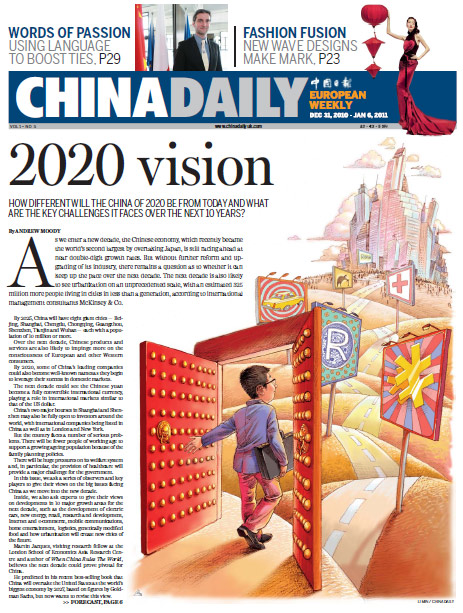Must-see sites! Stores selling luxury goods
Updated: 2010-12-24 12:41
By Zhang Haizhou and Zhang Chunyan (China Daily European Weekly)
Chen Qin and his wife are one example. The couple from Shanghai, both in their 30s, made out a thorough shopping plan before arriving in London about a fortnight ago.
During their less-than-a-week shopping tour here, the couple, whose total annual income could reach a million yuan (115,000 euros), have spent thousands of pounds on items including Burberry wallets, D&G handbags, Dunhill pipes, Gucci belts, scarves and perfume, Hugo Boss leather coats, shoes and trousers.
Unlike Li, the couple bought most of the items for themselves.
Xie Guozhong, a Shanghai-based economist, said Chinese tourists "coming from a newly affluent, increasingly unequal society, have a strong preference for the accumulation of material goods", the Economist reported.
|
|
Consulting firm Tourism Economics estimates that Chinese visits to Western Europe will rise to 2.4 million this year from 2 million in 2009. And their spending is on the rise.
Chinese tourists spent 99 percent more in the first 10 months of this year than a year earlier, according to tax-free shopping specialists Global Blue. The average transaction this year is 718 euros in the sort of high-end stores that provide tax-refund facilities.
As the Wall Street Journal recently reported, Burberry, whose first-half sales in Europe rose 12 percent to 224 million pounds, said Chinese tourists alone account for about 30 percent of total London sales. CEO Angela Arhendts said in early December that department-store partners are seeing similar trends in big European cities.
Chief Executive Francesco Trapani of Bulgari singled out Chinese shoppers as "a big factor" in the Italian jeweler's 11 percent rise in third-quarter European sales.
The Dow Jones Luxury Index, which measures the performance of companies worldwide that derive a sizeable portion of revenue from luxury goods and services, has risen 34 percent in the last year, according to the Wall Street Journal.
The Economist magazine cited in this year's last issue that a 2008 study by the European Travel Commission, an industrial group, estimates that Chinese tourists reserve more than a third of their holiday budgets for shopping.
The magazine sketched a "map of the Chinese grand tour" in Europe, marking Paris shop Louis Vuitton and German suitmaker Hugo Boss, near Frankfurt, as essential stops.
Swiss watches are also on their list, adds Stanley Jia, a veteran London-based tourist guide.
"Some people even buy several 200,000-pound watches in one go," he said.
Theft concerns
While Chinese consumers are spending big money on luxury goods, their own pockets have also been targets of thieves in Europe.
Unlike Westerners who are used to paying by credit cards, Chinese tourists typically carry a lot of cash wherever they go.
Yang Li, a 46-year-old from Yunnan province, suddenly found his bag gone when he was choosing shoes for his wife in shop of bootmaker Clarks on central London's Regent Street a week ago.
The businessman lost about 800 pounds and a digital camera on his first trip to Europe.
Jia, whose daily work has been guiding Chinese tourists over the past eight years, said Chinese tourists can easily become victims of theft. "Such cases have been happening in the past few years," he said.
Paper's Digest

Convertible yuan
The yuan is likely to be fully convertible and on the way to being one of the world's major currencies by 2020.
Fight against inflation
Words of passion
Euro vision
Specials

Internet aids luxury sales
More sophisticated Chinese consumers are surfing for luxury products on the Internet and a number of branded labels are ready to ride the wave.

Tobacco controls
An anti-smoking watchdog has criticized Chinese authorities for "making little progress" on enforcing tobacco controls.

Godfather of yachts
Traugott Kaminski claims he was the first person to bring the yacht culture to China seven years ago.

